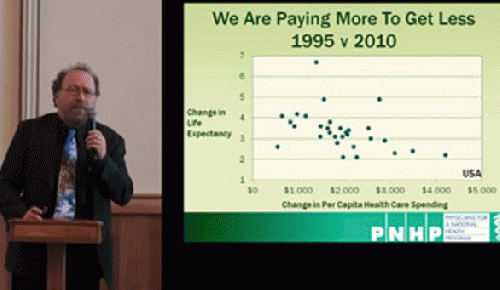Gerald Friedman: You've done some very interesting work with singer payer. My understanding is the Sanders campaign is using your findings. Is that correct?
Gerald: Yes, that's about right. I might add that if the Clinton campaign decided to do the right thing, I would be delighted to work with them as well.
Gerald: To come out for single payer.
Rob: As opposed to what do you see them doing?
Gerald: Little tweaks on the Affordable Care Act, which itself is reform of the existing private health insurance health system. A reform that has done some good things. It has brought health insurance coverage to millions of people and saved thousands of lives. But it leaves 30 million of people outside the health insurance system and tens of millions unable to access health care because of costs.
Anything that Hillary Clinton is talking about will not bring health care costs under control so that eventually, not that far off, we will be unable to afford health care. Health care costs have been rising for 40 years; I should say the price of buying the same health care has been rising significantly faster than other prices. Which has been driving, forcing us to put more and more of our resources into providing the same level of health care. And those rising costs have been pushing people out of the health care system and also forcing us to cut back on everything else we want to do as a society.
Workers haven't had wage increases so they can't go on vacation. Local governments have been paying more and more for health insurance for their employees so they have to cut back on education, they have cut back on roads. The Federal government has been unable to provide adequately for higher education, for infrastructure, because it's spending so much money providing health care. It's not as if we're getting better health care or more health care; we're getting less health care, but it's costing more and more. And nothing Hillary Clinton is talking about is going to change that.
Rob: Why is it costing more and more?
Gerald: Largely, a very few items, basically three. The rising administrative burden of operating the for-profit health insurance system. Health insurance has figured out that if they make it harder to file claims, people and providers, doctors and hospitals, will file fewer claims. That's basically using administrative red tape to drive people out of the system. And to hassle people so they will try to get other health insurance or they will just go away. Die.
Second, the rise and cost of prescription drugs, which have been rising much faster than anything else. The United States at this point pay 65% more for the same drugs than people in other countries -- and 70% more than the Veterans Administration pays for drugs. They are the only agency of the federal government that negotiates drug prices and they get lower prices; they get Canadian prices. All the rest of us pay twice as much.
Finally, monopolistic behaviors by elite, "must have" providers, notably elite hospitals. Massachusetts General charges four times as much for the same services as other hospitals. Massachusetts Hospital has been buying up and taking over other hospitals and other providers; and they keep jacking up prices. The same thing happens all over the United States. Hospitals have been consolidating, they've been raising prices, acting like monopolies. They may call themselves not-for-profit but in practice they are not taxed. They act like for-profit enterprises. That's it, with focus on those three.
The single payer system can take care of all of those problems. But nothing in the Affordable Care Act, nothing in Hillary Clinton's economic program will address those. And Clinton and many of her defenders, including prominent liberals, have basically said they understand that single payer will be better. But they lack the political will, the political strength, to take on the monopolistic hospitals, monopolistic drug companies, and the for-profit health insurance industry.
Rob: You've done this work, you've come up with these findings, for which states, organizations, etc.?
Gerald: I have done work for the United States a few years ago, for Physicians National Health Plan. I did a study for Massachusetts, one for Maryland State Single Payer Plan, one for Pennsylvania with Chuck [Pennacchio], one for Colorado, one for Oregon, Rhode Island, and New York. The NY study led to enactment by the lower house of the NY legislature of a single payer bill -- the most success we've had so far. But it's coming. And then I did an analysis for the Sanders' campaign for a national program, which is basically the work I did for Physician's National Health Plan.
Rob: There is an article in Vox, citing the work of Kenneth Thorpe.
[Emory University health care expert].
(Note: You can view every article as one long page if you sign up as an Advocate Member, or higher).






